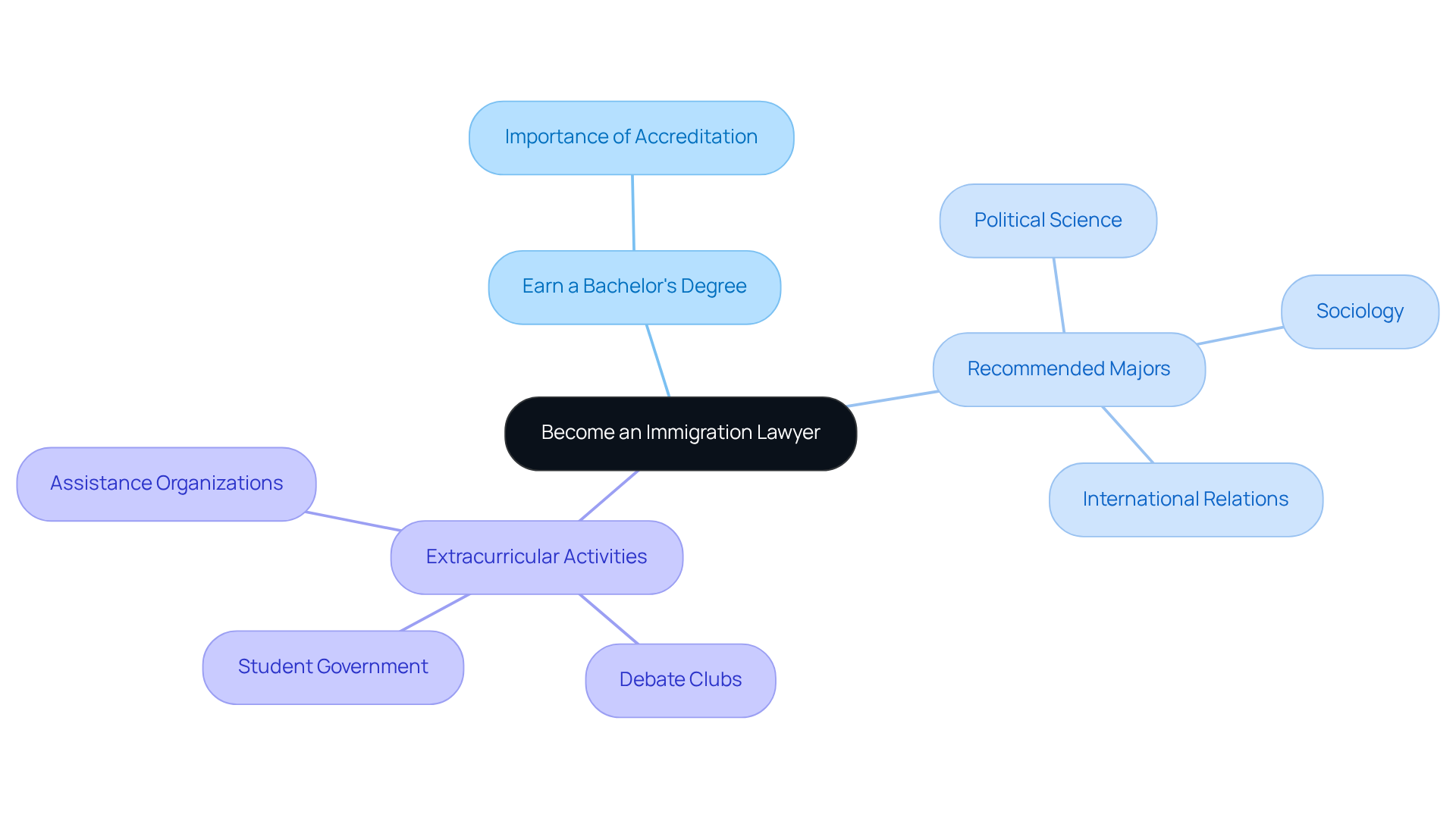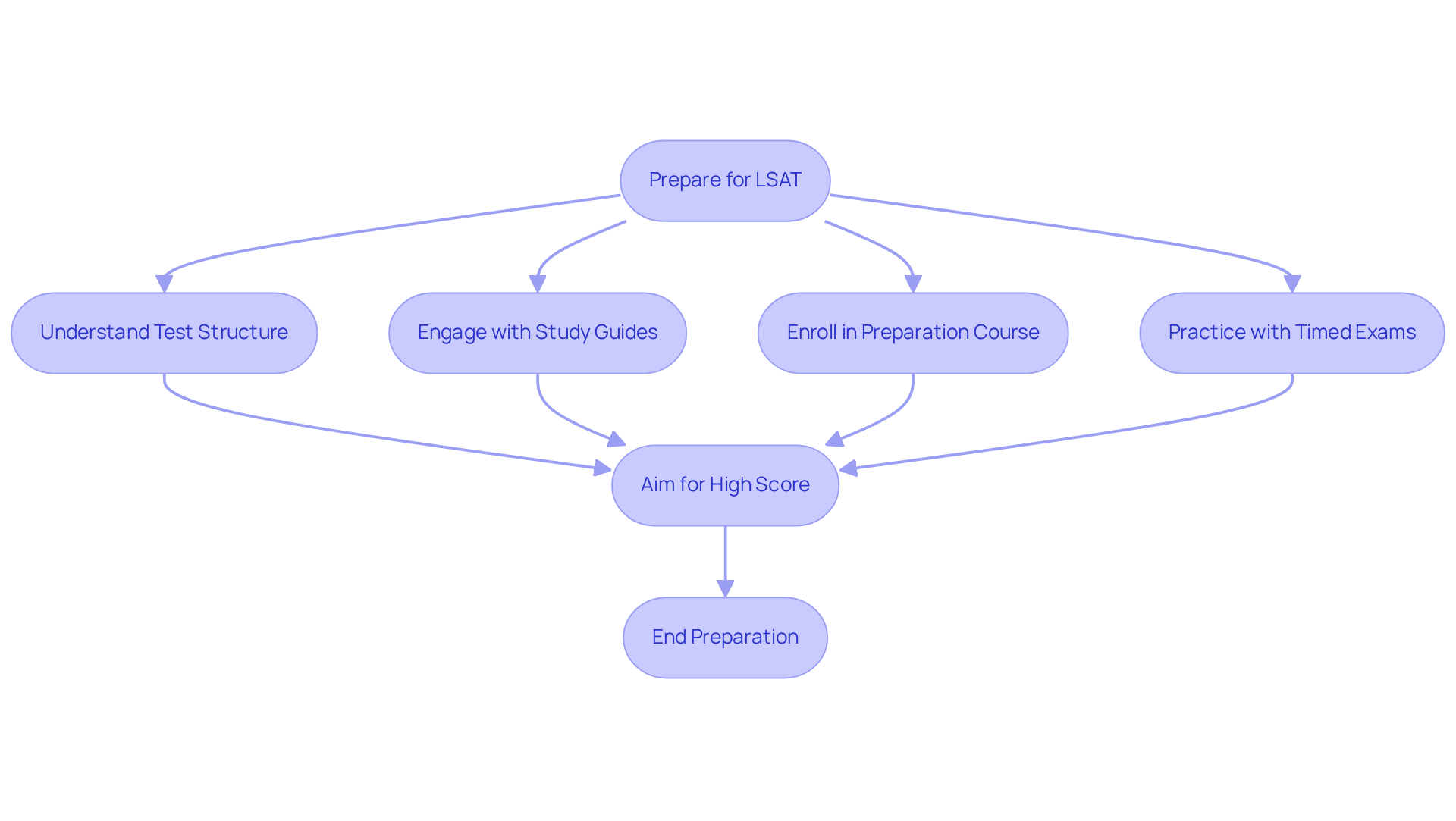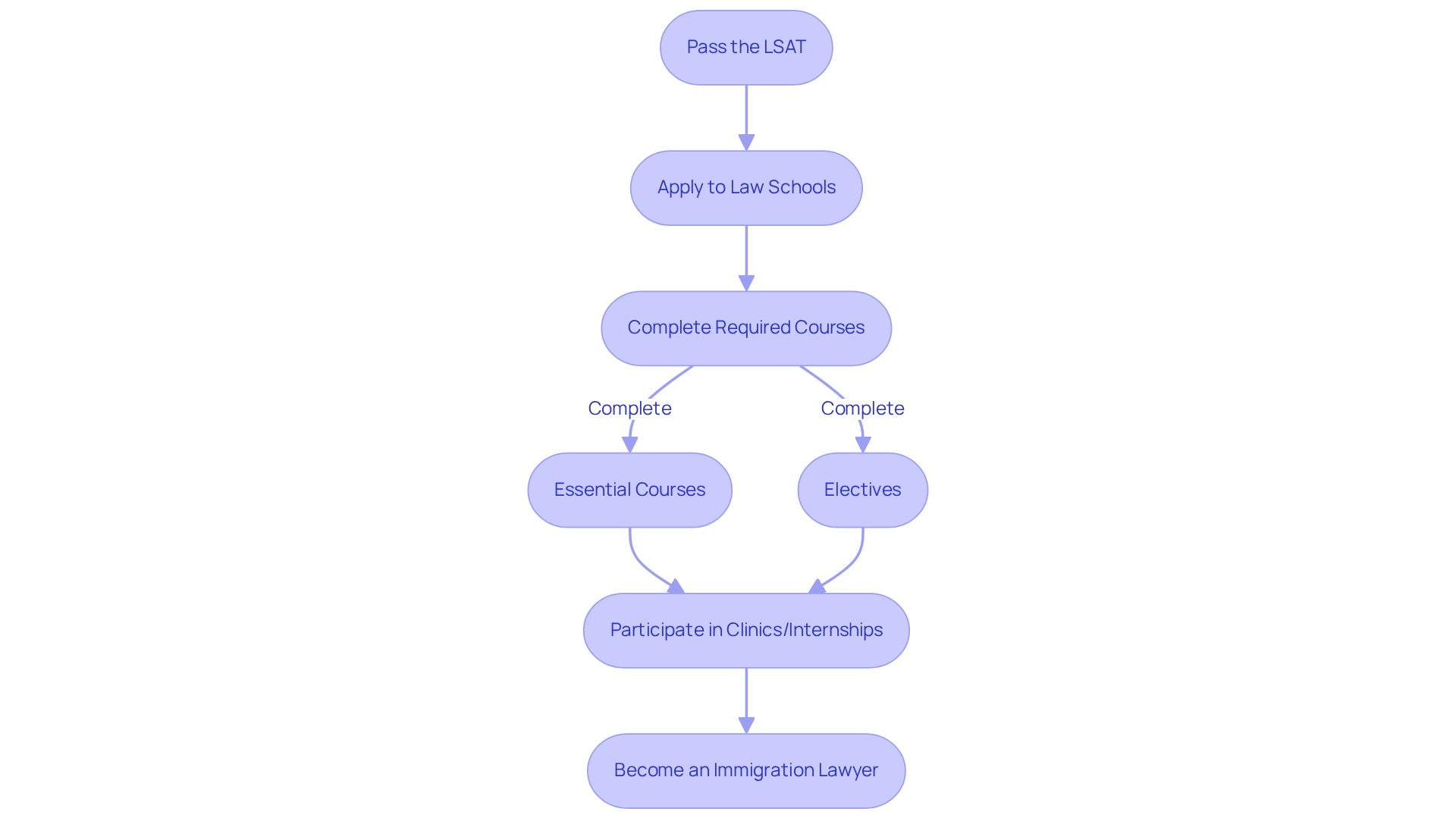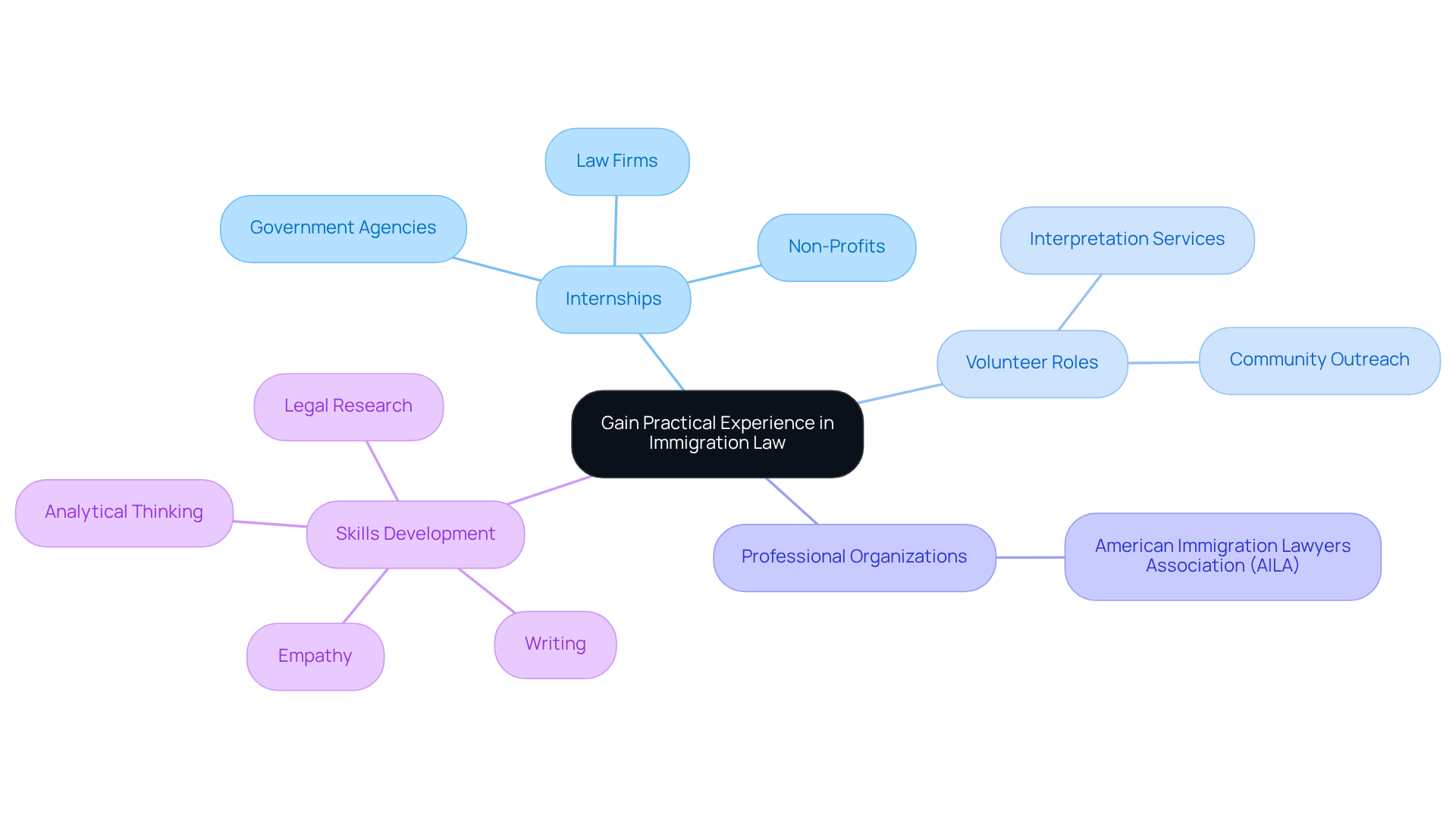Introduction
Navigating the confusing world of immigration law can feel overwhelming, especially for healthcare workers who want to advocate for their clients. This guide lays out the essential steps to becoming an immigration lawyer, shining a light on the unique opportunities for those with a healthcare background. But as the demand for skilled immigration attorneys grows, what challenges do aspiring lawyers need to tackle to make this vital transition?
Have you ever felt lost in the immigration process? You’re not alone. Many face the complexities of confusing regulations and denied claims. But there’s hope. We’re here to guide you through every step, ensuring you understand your rights and options. Remember, you don’t have to face this journey alone-we’re in the fight with you.
Earn Your Bachelor's Degree
Are you ready to begin your journey towards becoming an immigration lawyer? The first step is earning a bachelor's degree from an accredited institution. While there’s no specific major required, fields like political science, sociology, or international relations can be particularly beneficial. They lay a strong foundation for understanding the complex legal and social issues you’ll face. Did you know that about 10% of law candidates have degrees in political science? It’s a popular choice among future attorneys. Focus on classes that sharpen your analytical and writing skills - these are essential for success in legal education and beyond.
Engaging in extracurricular activities can significantly enhance your law school application. Think about joining:
- Debate clubs
- Student government
- Assistance organizations
These experiences not only boost your leadership and public speaking skills but also show your commitment to advocacy and community service. In a competitive admissions landscape, such involvement can set you apart, demonstrating your readiness for the challenges of legal education and practice. Plus, with the steady demand for becoming an immigration lawyer due to the ever-evolving nature of immigration issues, this career path is more relevant than ever.
Remember, you’re not alone in this journey. We’re here to fight for your future.

Pass the Law School Admission Test (LSAT)
After earning your bachelor's degree, the next crucial step is preparing for the LSAT. This test is a key part of your law program application, and understanding its structure and the types of questions is essential. Have you ever felt overwhelmed by the thought of this exam? Engaging with comprehensive study guides and enrolling in a preparation course can significantly boost your confidence and grasp of the material.
Statistics show that focused practice and expert guidance can lead to substantial improvements in LSAT scores. This makes investing in your preparation a smart move for your future career, particularly if you are interested in becoming an immigration lawyer. Regular practice with timed exams is vital for building the endurance you'll need on test day. Aim for a score that not only meets but ideally exceeds the average for your chosen law schools. This can greatly enhance your chances of admission.
Given the competitive nature of the current admissions cycle, with an 18% increase in applicants, achieving a high LSAT score is more important than ever for those considering becoming an immigration lawyer. Remember, you’re not alone in this fight - we’re here to support you every step of the way.

Attend Law School and Complete Required Courses
After passing the LSAT, it’s crucial to apply to law schools that provide a robust curriculum for becoming an immigration lawyer. You’ll want to focus on essential courses like constitutional law, contracts, and torts during your three years of study. But don’t stop there-choose electives that dive into citizenship law, international law, and human rights. Did you know that about 70% of law schools offer at least one elective in immigration law? This shows a growing recognition of its importance.
Participating in clinics or internships is vital. These experiences give you hands-on exposure to real cases, helping you build the skills necessary for effective client representation. Many successful immigration lawyers credit their internships with providing the essential experience needed for becoming an immigration lawyer, allowing them to tackle complex legal challenges and advocate for their clients’ rights. This practical exposure not only deepens your understanding of visa law but also significantly boosts your employability after graduation.
Remember, navigating the legal landscape can be overwhelming, but you don’t have to face it alone. We’re here to support you every step of the way.

Pass the Bar Exam to Obtain Licensure
To practice law in your chosen state, passing the bar exam is essential after graduating from law school. Have you ever felt overwhelmed by the exam format and the subjects it covers? It’s crucial to familiarize yourself with these areas, especially those relevant to becoming an immigration lawyer. Each state has unique requirements. For instance:
- California allows foreign-trained lawyers to take the bar exam without an LL.M. if their credentials meet equivalency standards.
- Florida mandates an LL.M. for bar admission.
Consider utilizing bar prep courses tailored to international candidates. These often include personalized coaching and resources designed to tackle the specific challenges faced by foreign-trained lawyers.
Creating a structured study schedule is vital. Candidates should allocate an average of 400 hours over several months for effective preparation, treating study time like a full-time job. Engaging in study groups can enhance your understanding and retention of material. Success stories from law school graduates highlight the effectiveness of programs like California's Strategies and Stories, which has helped over 1,000 participants pass the bar exam since 2018. This program underscores the significance of regular practice and review, especially for the Multistate Bar Examination (MBE), which demands quick decision-making and a solid grasp of U.S. principles.
Additionally, candidates must pass the Multistate Professional Responsibility Examination (MPRE®), which is required for bar admission in most jurisdictions. Understanding the specific rules and regulations of your jurisdiction is essential for effective bar exam preparation and licensure, which is crucial for becoming an immigration lawyer and enjoying a fulfilling career in immigration-related law. If you’re trained abroad, be aware that the credential assessment process may take as long as a year. It’s also important to consider the upcoming NextGen Bar Exam starting in July 2026, which will focus on practical skills like client counseling and writing. Networking and connecting with bar admission resources can provide valuable support throughout this journey.

Gain Practical Experience in Immigration Law
Becoming an immigration lawyer involves starting with an understanding of the real struggles clients face. Confusing immigration processes can leave many feeling lost. To navigate this landscape, actively seek internships or volunteer roles with law firms, non-profits, or government agencies focused on immigration legislation. These practical experiences allow you to apply your legal expertise in real-life situations, engage directly with clients, and manage the complexities of visa procedures.
Internships are particularly valuable. They not only sharpen your analytical and strategic thinking skills but also cultivate empathy and a deeper understanding of the challenges immigrants encounter. In fact, many law graduates who enter immigration practice credit their success to the practical skills gained during these formative experiences.
Consider joining professional organizations like the American Immigration Lawyers Association (AILA). Membership opens doors to networking opportunities with experienced attorneys and keeps you updated on the latest advancements in legal practice. Engaging in volunteer work - like providing interpretation services or assisting with community outreach - can also enhance your legal skills while making a meaningful impact on the lives of those you serve.
By immersing yourself in these practical experiences, you’ll build a solid foundation for becoming an immigration lawyer. Remember, you’re not alone in this fight; we’re here to support you every step of the way.

Conclusion
Becoming an immigration lawyer for healthcare workers is a journey filled with purpose and determination. It starts with essential steps:
- Earning a bachelor's degree
- Preparing for the LSAT
- Attending law school
- Passing the bar exam
- Gaining practical experience
Each of these milestones equips aspiring attorneys with the skills and knowledge needed to navigate the complexities of immigration law effectively.
Throughout this guide, we’ve shared key insights on each step, highlighting the importance of:
- A solid educational foundation
- Strategic LSAT preparation
- Specialized coursework in law school
- Invaluable hands-on experiences through internships and volunteer opportunities
Each component is crucial in developing a comprehensive understanding of immigration issues and the legal frameworks surrounding them.
But remember, the path to becoming an immigration lawyer isn’t just about meeting educational and licensing requirements. It’s about fostering a deep commitment to advocacy and service within the healthcare sector. As the demand for skilled immigration lawyers continues to grow, taking proactive steps today will pave the way for a meaningful and impactful career in immigration law. Engaging with communities, networking with professionals, and staying informed about legal developments will enhance your ability to make a difference in the lives of those navigating the immigration process.
We’re here to fight for your family. Your future matters to us. Yo Peleo - We Fight.
Frequently Asked Questions
What is the first step to becoming an immigration lawyer?
The first step is earning a bachelor's degree from an accredited institution.
Is there a specific major required for the bachelor's degree?
No specific major is required, but fields like political science, sociology, or international relations can be particularly beneficial.
Why are classes that sharpen analytical and writing skills important?
Analytical and writing skills are essential for success in legal education and beyond.
How can extracurricular activities enhance a law school application?
Involvement in activities such as debate clubs, student government, and assistance organizations can boost leadership and public speaking skills, demonstrating commitment to advocacy and community service.
What is the significance of the Law School Admission Test (LSAT)?
The LSAT is a key part of your law program application, and understanding its structure and types of questions is essential for preparation.
How can I prepare effectively for the LSAT?
Engaging with comprehensive study guides and enrolling in a preparation course can significantly boost your confidence and grasp of the material.
What is the impact of focused practice on LSAT scores?
Statistics show that focused practice and expert guidance can lead to substantial improvements in LSAT scores.
What should I aim for in terms of LSAT scores?
Aim for a score that not only meets but ideally exceeds the average for your chosen law schools to enhance your chances of admission.
Why is achieving a high LSAT score particularly important now?
Given the competitive nature of the current admissions cycle, with an 18% increase in applicants, achieving a high LSAT score is more important than ever.




